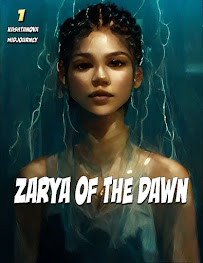Generative Artificial Intelligence: US Copyright Office denies registration _
Anna Maria Stein
Home / AI / Artificial Intelligence / authorship / copyright / human authorship / US copyright / Generative Artificial Intelligence: US Copyright Office denies registration
Generative Artificial Intelligence: US Copyright Office denies registration
Anna Maria Stein Thursday, March 16, 2023 - AI, Artificial Intelligence, authorship, copyright, human authorship, US copyright
On 21 February 2023, the US Copyright Office (USCO) issued a decision further to a request to register Zarya of the Dawn, a graphic novel that includes images created with the assistance of Midjourney, a generative Artificial Intelligence (AI) system.
The case
In September 2022, Ms. Kristina Kashtanova applied and obtained the copyright registration for the work “Zarya of the Dawn”. The work is a “comic book”. The cover page consists of an image of a young woman, the work’s title, and the words “Kashtanova” and “Midjourney”.
The remaining pages consist of a mix of text and visual material. The application did not disclose that the author used AI to create part of the work.
The USCO then became aware of statements on social media that the applicant had used the AI system Midjourney to create the book and asked the applicant for clarification due to the application being incorrect or, at least, incomplete.
The determination of the USCO
The USCO examined the different elements of the work: individual images generated through AI, text and selection and arrangement of images and text.
With regard to individual images, the USCO examined in depth how Midjourney works, underling that users operate through “prompts” (text commands) which include the image and text description of what Midjourney should generate. After that, the technology generated four images in response.
According to the USCO, Midjourney does not interpret prompts as specific instructions to create a particular expressive result, but simply converts words and phrases into smaller tokens that are used for the training of data and to generate an image. The main finding of the Office is that the process is not controlled by the user because it is not possible to predict what Midjourney will create ahead of time. This process is not the same as that of a “human” artist, writer, or photographer.
Based on this, the USCO concluded that the images generated by Midjourney contained within the work are not original works of authorship protected by copyright, since Midjourney generates images in an unpredictable way. The fact that Midjourney specific output cannot be predicted by users makes Midjourney different for copyright purposes than other tools used by artists (e.g. editing tools, assistive tools) which allows the choice of specific changes and includes specific steps to control the final image “such that it amounts to the artist’s own original conception” (on digital art and copyright protection see the recent Italian Supreme Court decision commented by IPKat). Also, time and efforts by the applicant in working with Midjourney do not imply authorship under copyright.
In sum, the USCO denied the registration for the images generated through the AI system concluding that “text prompts” were insufficient to qualify as "human authorship".
Regarding the text and to the selection and arrangement of images and text, the USCO agreed that they are protectable under copyright. The text was written by the applicant without the help of any other source tool and therefore is to be considered a product of human authorship. The selection and arrangement of the images and text that were conducted by the applicant contain sufficient creativity and are protectable as a compilation under copyright.
The original registration was therefore cancelled and replaced with a new registration covering the text and the selection and arrangement of images and text, which resulted as being entirely done by the “human” applicant.
Some preliminary thoughts
This decision applies some key copyright principles to AI-generated works. The USCO focuses on the distinction between the conceiving of an idea of an artwork and its fixation into a tangible medium of expression and the requisite of originality as independent creation with a modicum of creativity. The USCO emphasizes that authorship has to be limited to the creations of “human authors”, according to some US case-law dating back to 1884 (Supreme Court Burrow-Giles Lithographic Co. v. Sarony). Therefore, any activity, even if original, carried out by the AI cannot be qualified as authorship under copyright, it not being “human”. This is in line with what is stated in the Compendium of Practices and with the previous decision of the USCO dated 14 February 2022 commented by IPKat).
From an European perspective, the Court of Justice of the European Union has declared on several occasions that copyright only applies to original works and that originality must reflect the “author’s own intellectual creation” (see case C-5/08 Infopaq International A/S v Danske Dagbaldes Forening). This is usually understood as meaning that a human author is necessary for a work to enjoy copyright protection.
Picture of the cat courtesy of Barbara Bonora



